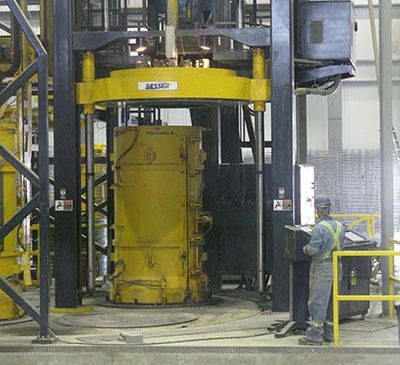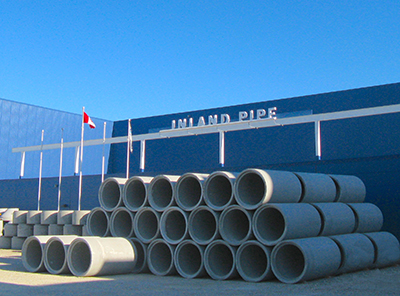Producers embrace technology to strengthen core values of safety and service
To understand the implications of technology for concrete pipe and precast producers, let’s start with Michael J. Fox and Jamie Tremain, vice president and general manager of Inland Pipe/Ocean Pipe affiliates of Lehigh Hanson in Canada. Both are from Western Canada, and Tremain started his career in 1985 at the same time Fox starred in his breakthrough movie, “Back to the Future.”
When explaining the impact of technology today and in the future, Tremain first travels back in time to 30 years ago when he started in the industry in Calgary, Alberta. There was little difference between the core product delivered to customers then versus what’s produced today. However, there was an enormous difference in how things got done. In 1985, workers did their work by hand; setting up cages, breaking manhole openings in boxes, and repetitive, backbreaking motion for everything. Even ready-mix concrete was batched old school with levers and wheels. The result was acute and chronic health and safety issues.

Market demand was driven by infrastructure of national, provincial and local government through general contractors with a tight schedule. Contractors put a premium on establishing trust with their precast producers. Saving a few dollars here or there on the product was inconsequential if the alleged savings compromised the goals of being on spec and on time, every time.
TRADITIONAL GOALS, MODERN TOOLS
Fast forward to the 21st century, where we’ve seen huge improvements in worker health provisions. Now, cage machines auto-load wire instead of workers hand-feeding rods 12 hours a day. 3D foam milling machines make forms for manhole openings instead of the manual process of breaking and re-mortaring for manholes. These and other technology improvements have greatly reduced neck and shoulder injuries for workers.
Tremain is also looking to 3D printing machines that can make 2-meter square forms in a few hours. So far, the capital cost versus the production speed is still too expensive. Not to be discouraged, he is intrigued by the combination of micro-tunneling and 3D printers. Although expensive, micro-tunneling is often cheaper for some applications than open trenching. Combining this with a 3D printer running behind the cutting bit and “casting” material as it inches forward shows real promise in the not-too-distant future.

Technology is also shaping customers’ behavior and expectations. Amazon is a reality: When we buy things today, we spend far less time going to stores and more time on our phones. The point is not lost on Tremain; pipe and precast producers have to find new ways to communicate and build high-trust relationships with contractors. He has assembled a team of engineers to work on providing as much transparency and real-time information to customers as possible.
Providing this kind of information requires a modern framework with all the bells and whistles of cloud computing and mobility, but getting the information can be a challenge. Tremain looks forward to embedding RFID chips in each precast element that reveal properties of the concrete mix, curing strength and other structural data. With this technology, the producer could more accurately track work in progress and inventory, as nothing would ever leave the yard unnoticed.
We live in a world that is moving fast. With worker safety as the top priority, we need to produce faster with higher quality and strive to meet customers’ expectations for real-time, meaningful contact. On top of this are the new demands of Covid-19 exposure, which we are just beginning to understand. All of these challenges must be met while maintaining the timeless standards of the industry: Trust, on-spec, on-time, all the time. As Doc Brown famously said to Marty McFly, “Your future is whatever you make it. So, make it a good one.”

Craig Yeack has held leadership positions with both construction materials producers and software providers. He is co-founder of BCMI Corp. (the Bulk Construction Materials Initiative), which is dedicated to reinventing the construction materials business with modern mobile and cloud-based tools. His Tech Talk column—named best column by the Construction Media Alliance in 2018—focuses on concise, actionable ideas to improve financial performance for ready-mix producers. He can be reached at [email protected].